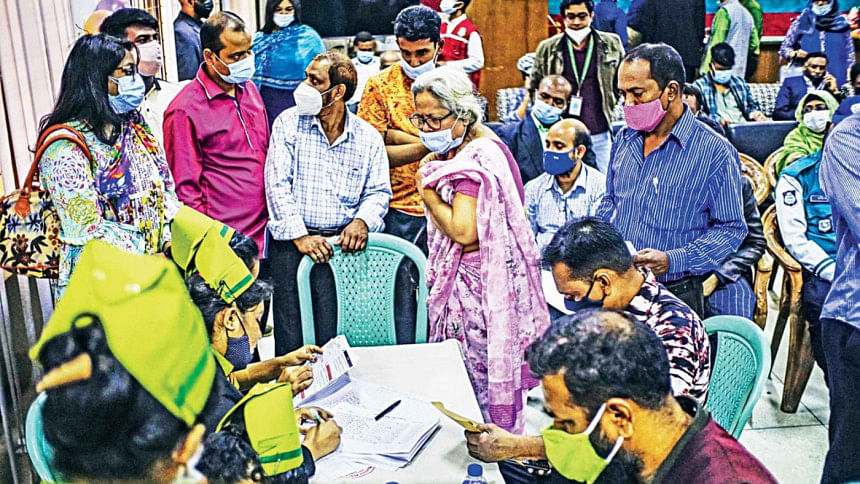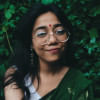Is the priority list of vaccine recipients being maintained?

Now that the few crores of Covid-19 vaccine doses are finally arriving in Bangladesh in batches of tens of lakhs (and many more have been promised to be on their way soon), a new challenge has presented itself for those in charge of distributing the vaccines. That is, the challenge of organising the inoculations in such a way that those who are most vulnerable to the virus are immunised before everyone else.
According to the CDC (Centers for Disease Control and Prevention) in the United States, it is recommended that the initial supplies of vaccines be administered to "healthcare personnel and long-term care facility residents". Given how much more susceptible the elderly are to the virus, they are also usually included in the list of persons to be prioritised during the initial stages of the vaccination programme.
Bangladesh's Covid-19 vaccination campaign is also in line with this, as only people aged above 40 years and frontline workers are supposed to be vaccinated on a priority basis during the current stage of the plan. However, there are some sizable loopholes in the registration process, and people who do not fit the priority criteria are being able to successfully register for and receive the vaccine.
In order to get the vaccine, one has to register online through the website surokkha.gov.bd using information from their NID card and fill out any other required details. If a frontline healthcare professional, above the age of 18 years, wishes to register for the vaccine then they simply need to put in their National Identity Card number in order to get in line and receive the Covid-19 vaccine.
Of course, this presents an issue as there is no way for the automated system to verify that the individual is actually a frontline healthcare worker. In a report published on February 15, 2021, an official linked to the vaccine registration process (choosing to remain anonymous) told The Daily Star that because "the DGHS has no complete list of public and private healthcare staffers in the frontline, the bar was withdrawn recently." He also added that the list which they were provided was not in a "format that supports the database of surokkha.gov.bd".
Even though frontline professionals aged below 40 years of age had to have their NID numbers sent through their respective organisations (and then to the DGHS) in order for them to be uploaded to the website's server, there are still major gaps in the registration process which allow many individuals who are not qualified for the priority-based vaccines to still get inoculated.
However, what might be considered more disconcerting is the DGHS's response to a mishap of such a scale. It was said by the director of the organisation's Management Information System that, "...the system will not understand who is a health worker and who is not. In the long run, everyone will register and we have to vaccinate everyone. Now if anybody does this [faking professional identities], we cannot do anything about it."
It is understandable—and truth be told, expected—that those in charge of vaccinating a nation of over 16 crore people, with many limited resources, would slip up quite a few times along the way to achieving the aforementioned goal. The issue of insufficient human and other resources is present in Bangladesh no matter what the crisis is. As such, it is commendable that the government has been able to procure the number of vaccines that it has, and that the inoculation process in our nation has begun at the same time as that of other countries with much better stocks of these resources.
Still, this bit of necessary efficiency and success does not automatically discharge the authorities of the responsibility of sticking to their promises. When a rule such as the one in question (that of frontline healthcare workers' vaccination being prioritised) is put in place, it gives people a sense of security and acts as confirmation that their government genuinely has their best interests in mind.
It also goes without saying how important a rule such as this one is. But, alas. While the elderly (in this case, those above the age of 40 years) need to be vaccinated first due to their special physical vulnerability to the virus, the other category of people whose vaccination must be prioritised are those who are most exposed to the virus. Obviously, healthcare staff who are constantly in contact with and are spending the majority of their 24 hours tending to diseased individuals fall under this category.
If those who are personally making sure that we are protected from Covid-19 cannot themselves be shielded from it first, then that exposure will inevitably trickle down to the rest of the population as well. Sure, more and more people are being vaccinated each day. But that does not justify purposely slowing down progress wherever we can achieve it.
It is now more important than ever before—during a global pandemic—that our government must urge all those institutions that are part of the inoculation programme to be strict and vigilant.
The vaccines have arrived and we are thankful for it, but the journey does not even come close to ending here. Now is our opportunity to pull our weight and fight the virus (and its looming variants) with not just the preventative vaccines, but also our own willpower.
Afia Jahin is a member of the editorial team at The Daily Star.

 For all latest news, follow The Daily Star's Google News channel.
For all latest news, follow The Daily Star's Google News channel. 



Comments